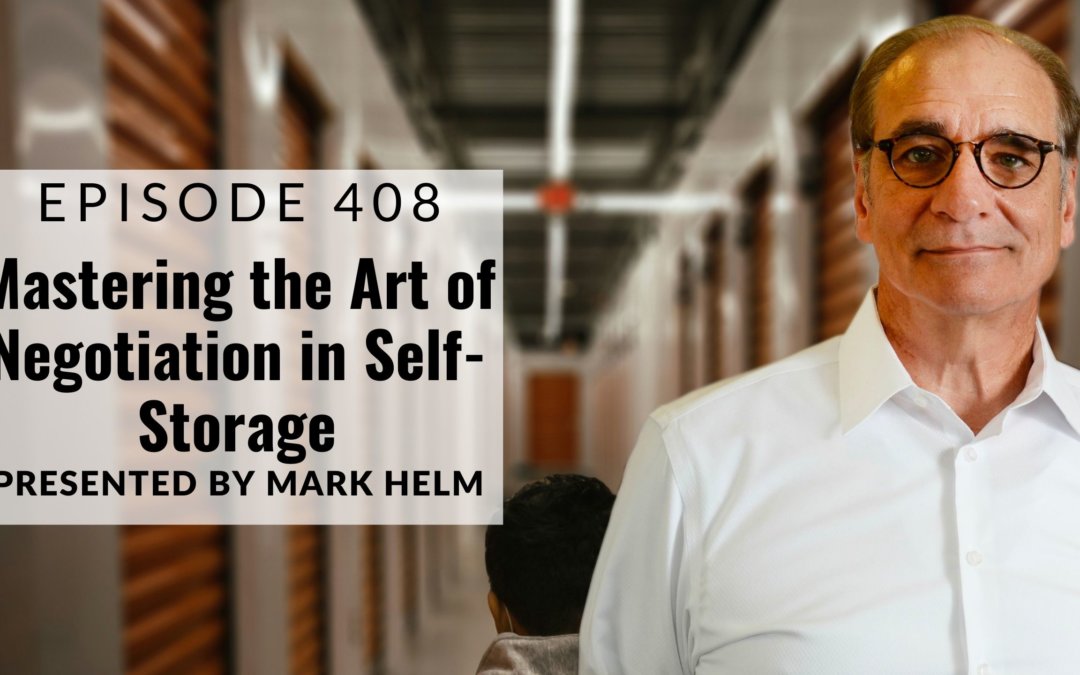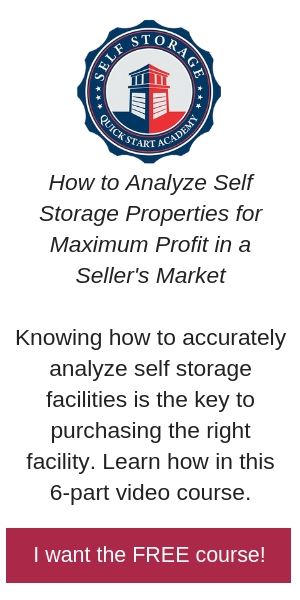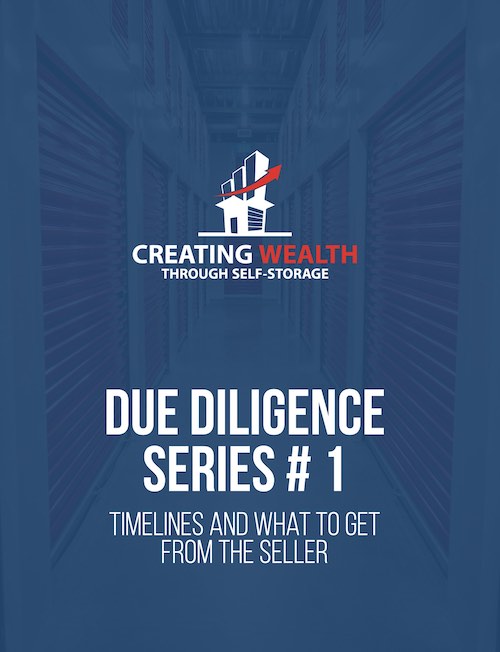Given I am writing this in early Jan. 2024 and focusing on a back-to-the-basics series for getting into the self-storage industry because we have a lot of new people in the community and because I have just put out two detailed episodes on how to analyze, I thought I might discuss what my thoughts are on negotiating and controlling a potential storage deal.
Mindset
Let me start here, as always.
Knowing what to do is great, and you must know it, but in life, I think about 80% of your success lies in how you think, not what you know.
Your mindset.
Yes, I like to buy low and sell high.
But I am not an “Art of The Deal” kind of person.
I like to approach life from more of an abundance mindset.
The best deals, and how I have achieved whatever success I have in life, is by creating deals where both Seller and Buyer come out ahead.
Stephen Covey called it win-win thinking.
If I am a buyer, that does not mean the Seller has to take a big hit for me to get a good deal. And vice-versa.
But know that is where I come from as I negotiate, try to control deals, and write about the subject.
I want to get what the true motivation of the Seller is.
They often don’t know, but that is my goal to know on every deal.
Hint: The goal is not the money.
Everyone thinks it is, but it is not.
It is what they think the money will provide them. That is what I want to understand.
Whatever they think money will provide them, that thought creates an emotional response in them every time they think about it.
I want to know what that is so I can speak it. I want to be associated with that emotional response.
When I can do that, sometimes magic happens.
Also, in the realm of mindset, my relationship to controlling a self-storage opportunity is this:
- I want the storage opportunity standing still at a known price and a known amount of time. During that time, I will replace the assumptions in my Proforma with real numbers.
Period. That is all I am doing when I get control of an opportunity.
It helps me not to think of myself as a Buyer yet; I am just trying to control the deal so I can see if it works.
Only towards the end of the due diligence period do I begin to see myself as the Buyer.
At least, this is my goal and how I approach self-storage deals.
Now, with that said, let’s dive in.
Controlling A Self Storage Opportunity
Suppose you have run your preliminary analysis as discussed in the last few episodes, and this opportunity appears to meet your business strategy’s benchmark requirements. In that case, it is critical that you try to control that property as quickly as possible.
Now, I know if you are new to the business, Brokers often want to deal with seasoned people with a lot of money they can point to.
This may not be you. It certainly wasn’t me when I got started in the business.
There are ways to address this that work sometimes, and we will cover them in another episode. We will deal directly with it in the QuickStart Self-Storage Bootcamp. If you are new and syndicating or using just a little money to get in the business, just know you will most likely have to deal with this.
I like using a Letter of Intent (LOI) to control a property first.
Often, those details can upset the Seller, and I don’t want to do that at this stage.
The business terms are the most important to the Seller and you anyway, so start there.
I think an LOI should include price, terms (i.e., financing, owner finance, etc.), length of due diligence, contingencies, and other important deal points.
Once you and the Seller agree with these main business terms, get the LOI converted into a contract as fast as you can.
In my opinion, it is best practice to have your attorney turn that into a contract.
However, I realize that is not always possible. If the Seller or listing agent says they want to generate the contract, that’s OK with me. We will have our attorney react to their contract.
Here are some tips and best practices I recommend after making lots of mistakes in this area.
If possible, always see the deal before you write the LOI.
I remember once I wrote LOI, controlled property, then went to see it.
The area was much worse than I expected, and I bailed fast.
A week or so later, I was writing another LOI, and I saw it was with the same agent I had just bailed on. How excited was he to present my new POI to a new client?
This is a small world, and we deal with the same people repeatedly. I know it is not always possible to see before an LOI, but if you can, it helps.
It also helps in negotiating because they know you have taken the time to see the property and may have met you, which could help improve your negotiating position over someone who hasn’t seen the property.
Know your numbers.
Know what you can pay.
Know the most likely value-added play you can do and the value created from it. Know how long it will take and the cost.
Know your preliminary numbers before you go to see the property.
Then, adjust your assumptions based on what you see.
In my training, the people I work with and I end up knowing the numbers better than the Seller and the agent. You have real negotiating power when you demonstrate your knowledge of their income, expenses, and what is happening in their trade area.
Try to meet and know the Seller.
Try to meet and get to know the Seller.
This isn’t always possible, but if you can, be sure to meet them.
I can’t tell you how often that has made a difference for me, not only in the upfront negotiations but throughout the deal and after the closing.
Find out what their real goals are. Why are they selling? What do they want to get out of the sale?
Then, help them achieve those goals.
I have talked about this a lot in other episodes and in the book Creating Wealth Through Self Storage, but in the Seller’s mind, if they associate you with their achieving their goals, you will buy the facility.
We have bought more than one where we were not the highest offer. I think this had a lot to do with it.
Be someone you would want to do business with.
For example, don’t enter a deal knowing you will renegotiate after an inspection.
Rarely does that work anyway.
I am not saying I have never negotiated after something turns up in an inspection; I just don’t make that part of my purchase strategy.
If you know you are going to re-pave, re-roof, or something, put that assumption in your original offer.
You would not want to have to deal with that if you were selling.
I know there are a lot of books and “The Art of The Deal” kind of mentality in approaching negotiations. However, in today’s market, where there are many people who will step up and take your place, I think you are just shooting yourself in the foot by being that way.
The self-storage world is not that big. You will deal with the same people throughout your career, especially when buying.
Just do what you say you will do and do it by when.
If the Seller insists on a 30-day or 45-day due diligence period, and I think there is a chance I will not be ready by then (which is often the case today because lenders, appraisers, people doing inspections, etc. are so busy), I tell them that. I will accept their shorter time period, but I will negotiate a right to extend it.
I may have to pay for that, right, but I put it in the original deal; I don’t just think I will deal later with it because they will not want to lose the deal.
If you are someone people want to do business with…guess what…you will do business.
These are just my thoughts on the art of negotiating self-storage opportunities. I know many of you may be better negotiators than I am, but this is the approach I take.
Whatever your style, use it to control storage deals. Let’s make 2024 the year you get in or grow your business.




This is good write up as usual. It is however written from the buyer’s perspective. I wonder what would be your advice and your description of the “how to” from a seller’s perspective? Especially from the perspective of a seller who is reasonably knowledgeable around valuation? I own a 365 unit indoor climate controlled facility that I converted five years ago from a previous factory facility. I get calls on a semi regular basis from interested buyers and brokers. I would like to understand how best to maximize value in a sale and how best to maneuver this process and how to best select the best buyer candidate(s) from a pool of many.